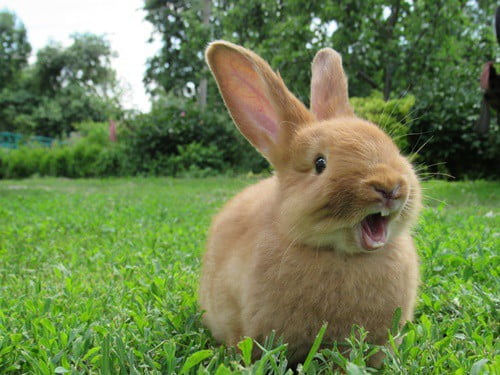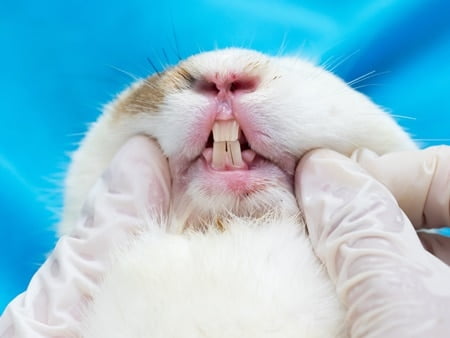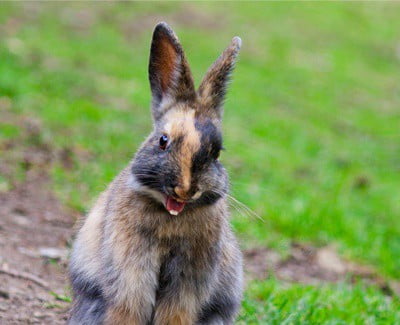Your rabbit’s teeth will tell you about how she’s feeling. Rabbits involuntarily express themselves through their teeth. A rabbit gently chattering her teeth is a sign of enjoyment, which suggests that your rabbit is relaxed and happy. Loudly grinding her teeth isn’t an encouraging sign, though.
Teeth grinding in rabbits is usually a sign of pain. If your rabbit grinds her teeth and is shaking, she is in significant discomfort. Rabbits grind their teeth to self-soothe.
Tooth chattering is a low sound, often occurring while being petted. Tooth grinding is louder, and the noise is more disparately spaced. Tooth grinding is also often accompanied by bulging eyes or shaking. These are classic signs that your rabbit is in a lot of pain.
My Rabbit is Grinding Her Teeth
Alongside tooth grinding, key warning signs that a rabbit is in pain include:
- Refusal to engage with humans or other pets. Rabbits are social creatures.
- Reluctance to exercise. Healthy rabbits have lots of energy, especially in the morning.
- Lack of grooming. Rabbits are clean animals, so your pet will not neglect her grooming.
- Refusing to eat or drink. Rabbits love to eat.
- Strange posture. If your rabbit is hunched over, it suggests a digestive issue. If she is avoiding placing weight on a particular limb, she may have an impact injury.
- Biting and nipping when attempting handling. Many rabbits dislike handling, but tolerate it when necessary. If your rabbit becomes aggressive when you attempt to pick her, she’s in pain.
- No sleeping. Rabbits need their sleep. If your rabbit seems incapable of dozing off, pain is likely keeping her awake.
Once you have established that your rabbit is in pain, you need to learn why. Attempt to assess the source of your rabbit’s discomfort. This will speed up any treatment plan.
- Pain after surgery. If your rabbit has recently had surgery, she’ll be uncomfortable in the aftermath. Expect tooth grinding for a day or two after spaying, for example.
- Sprained or broken limbs. Rabbit skeletons are frail, so accidentally dropping a rabbit or a fall from a height can cause injury.
- Dental pain. Rabbit teeth never stop growing. If they are not kept trim, your rabbit will experience all manner of pain. Gum disease can also affect rabbits.
- Joint pain. As rabbits age, they become susceptible to arthritis and similar conditions. This means they your pet’s limbs will hurt and ache every time she moves.
- Urinary infections. Female rabbits can be prone to UTIs. This becomes increasingly common in middle age. Watch for other warning signs, such as incontinence and reluctance to urinate.
- Gastrointestinal problems. Rabbits can experience problems with intestinal blockages. These are deadly to your pet, and must be addressed urgently.
How Can I Relieve My Rabbit’s Pain?
To help a rabbit in pain, your first need to know the cause. Never offer your pet human paracetamol or ibuprofen as a cure-all. These medications are toxic to rabbits.
You can run tests on your rabbit to assess for particular pain-points. Don’t be surprised if your rabbit will not let you touch her. If she’s in pain, a rabbit will reject any suggestion of handling. Prepare yourself for nips and bites. Gloves may be advisable, for your safety.
- To check for tooth pain, offer your rabbit a favored hard treat. If your pet refuses to eat, she is likely in dental discomfort. Most rabbits cannot resist these sugary vegetables.
- To check for muscular pain or impact injuries, gently attempt to touch your rabbit’s limbs. Start by petting her head and back. When she relaxes, move to the limbs. If she flinches or flees, you likely have your answer.
- To check for urinary infections, pay close attention to your rabbit’s waste. Test her urine for flecks of blood, but be aware that red pee does not always equal bleeding.
Infections are usually cleared up with antibiotics. Your vet will also be able to offer an oral painkiller.
Degenerative issues, such as arthritis, require more long-term care. Look for supplements that will ease your pet’s discomfort. You should also massage your rabbit’s limbs regularly.
Dental pain will usually require a vet. Your rabbit’s teeth will likely need to be trimmed, using professional equipment. In the meantime, encourage your rabbit to chew plenty of hay. This will trim her teeth the natural way.

Do Rabbits Grind Their Teeth When Stressed or Anxious?
You should always consider whether your rabbit’s anguish is mental rather than physical. Stress can provoke tooth grinding in rabbits. Unfortunately, rabbits are easily stressed.
You could be upsetting your pet without even realizing it. The long list of common stress triggers for rabbits include:
- Loud, unexpected noises.
- Changes to routine, including times established for feeding and play.
- Too much time alone.
- New experiences, such as visiting the vet or car journeys.
- The presence of other, potentially predatory animals or pets.
- Too much time in the hutch.
- Small, unsanitary living quarters.
- Cramped temperatures and inadequate ventilation.
- Too much bright light.
- Excessive handling from humans.
- Bullying from another rabbit in the same hutch.
- Boredom, and a restriction of instincts. This could mean an inability to run, dig, or climb.
- Grief, such as the bereavement of a bonded friend.
Stress is not just mentally draining for rabbits. It’s also physically dangerous. A stressed rabbit frequently becomes susceptible to disease and sickness.
My Rabbit is Grinding Her Teeth and Drooling
Excessive saliva in rabbits is a medical condition called ptyalism. The drooling that your rabbit exhibits is just a symptom of this issue. She will also be in significant pain, hence the tooth grinding.
In addition to drool and tooth grinding, look out for the following warning signs of ptyalism:
- Refusal to eat and sudden loss of weight.
- Discharge from the eyes and/or nose.
- Wet fur around the mouth.
- Loss of fur around the mouth.
- Misaligned symmetry in the face.
A range of factors could cause ptyalism. Some rabbits develop the issue when they spend too much time in warm temperatures.
More often, it’s a result of gum disease, oral abscesses, or misaligned teeth. This could be bad luck or genetics, or caused by your rabbit chewing inappropriate materials. A rabbit that does not eat enough hay will be at particular risk.
As ptyalism is painful, you should get your rabbit to a vet post-haste for treatment. A professional will run tests to ensure there is not a more concerning underlying explanation.
If the diagnosis is ‘only’ ptyalism, lifelong care will still be required. You will need to review your pet’s diet, ensuring she eats enough fiber. Your rabbit may need dental surgery to relieve her immediate discomfort. Any infection that arises from the ptyalism will be treated with antibiotics.
My Rabbit is Grinding Her Teeth and Not Eating or Drinking
Never allow a rabbit to go longer than 24 hours without eating. If she is also grinding her teeth, the problem is serious. Aside from ptyalism, possible explanations include:
- Overgrown teeth. Your rabbit’s teeth may be too long. If the top and bottom rows overlap, it will become painful to eat. They need to be trimmed.
- Stress and anxiety. Rabbits lose their appetite when stressed. Calm your pet down, and encourage her to eat and drink.
- Intestinal blockages. If your rabbit cannot digest her food, she will not consume any more. She’ll also be unable to eliminate.
- Bacterial infection. If your rabbit is under the weather, she will not feel like eating. Unfortunately, this will weaken her immune system further.
If your rabbit will not eat or drink, she’ll need intravenous fluids. This will buy time while an explanation is sought.
My Rabbit Grinds Her Teeth While Being Petted
If your rabbit grinds her teeth when stroked, she likely is not grinding her teeth at all. She is actually purring with pleasure. This involves a rabbit softly chattering her teeth.
Until you know the difference between these sounds, it can be hard to tell them apart. Be assured of one thing, though. A rabbit that is in pain will not allow you to pet her.

There is always the chance that pleasure can turn to pain. Rabbits can become over-stimulated when petted. It’s important to learn your pet’s subtle cues that she has had enough. These include:
- Bulging eyes and looking around the room. Your rabbit is seeking a safe escape route.
- Shifting and squirming in your lap. Your rabbit is growing increasingly antsy and uncomfortable.
- Low growls. This is a rabbit saying that she is growing restless and frustrated with all the attention. She wants to be left alone.
- Digging in your lap. Some rabbits do this out of curiosity. Others do it to annoy you so you’ll stop petting. Learn about your pet’s particular digging behaviors.
- Soft tooth chattering becomes loud, agitated tooth grinding. Your rabbit is now sore from all the attention. Alternatively, she may be growing anxious and wants to return to solid ground.
- Biting or nipping. If you miss all the subtle cues, your rabbit will resort to physical means.
Every rabbit is unique. There is no hard-and-fast rule about how much petting is enough. Some pets will want to be stroked all day, every day. Others will grow weary after five minutes.
What is universal among rabbits is a desire to call the shots. Your pet wants to decide when she has been petted enough. By learning her body language and vocal cues, you’ll ensure a stronger bond.
My Rabbit Grinds Her Teeth During Sleep
Much like petting, a rabbit that grinds her teeth while asleep is more likely purring. If your pet is relaxed enough to doze, it means she’s contented.
If your rabbit flops after playtime and falls asleep on the spot, she is probably purring. Especially if she lies with her tummy exposed. No rabbit would sleep in such a compromised position without feeling completely safe and relaxed.
One scenario that may cause a rabbit to grind teeth in her sleep is bad dreams. Rabbits dream while they sleep, which means they can have nightmares. These will provoke feelings of anxiety.
Rabbits forge emotional memories based on experience. A rabbit running in her sleep is likely dreaming of a fun playtime. Sadly your pet may also dream about bad experiences.
Never wake a sleeping rabbit, even if she seems distressed. Eventually, your pet will wake of her own accord. Give her a reassuring stroke and treat when she does. This should cease the tooth grinding.
Tooth Grinding vs. Tooth Chattering
There are some critical differences between teeth grinding and purring. These are as follows:
- Volume. Teeth grinding is a loud, angry sound. It’s impossible to ignore. Tooth chattering is gentle, and even melodious.
- Frequency. When a rabbit grinds her teeth, it’s a slow, spaced-out action. Chattering, meanwhile, is near-constant.
- Eye movement. Look at your rabbit while she moves her teeth. If her eyes are closed, she is chattering in contentment. If they are bulging and alert, she is in pain or frightened.
- Body movement. A rabbit that shakes is almost certainly grinding her teeth in stress or pain. She needs to be helped, as quickly as possible.
Over time, you’ll get to know your pet and her mannerisms. Rabbits are not vocal animals. This means that learning the patterns of her tooth movements is pivotal to understanding her mindset. Rabbits do not show any signs of ill health until they cannot hide it any longer.

